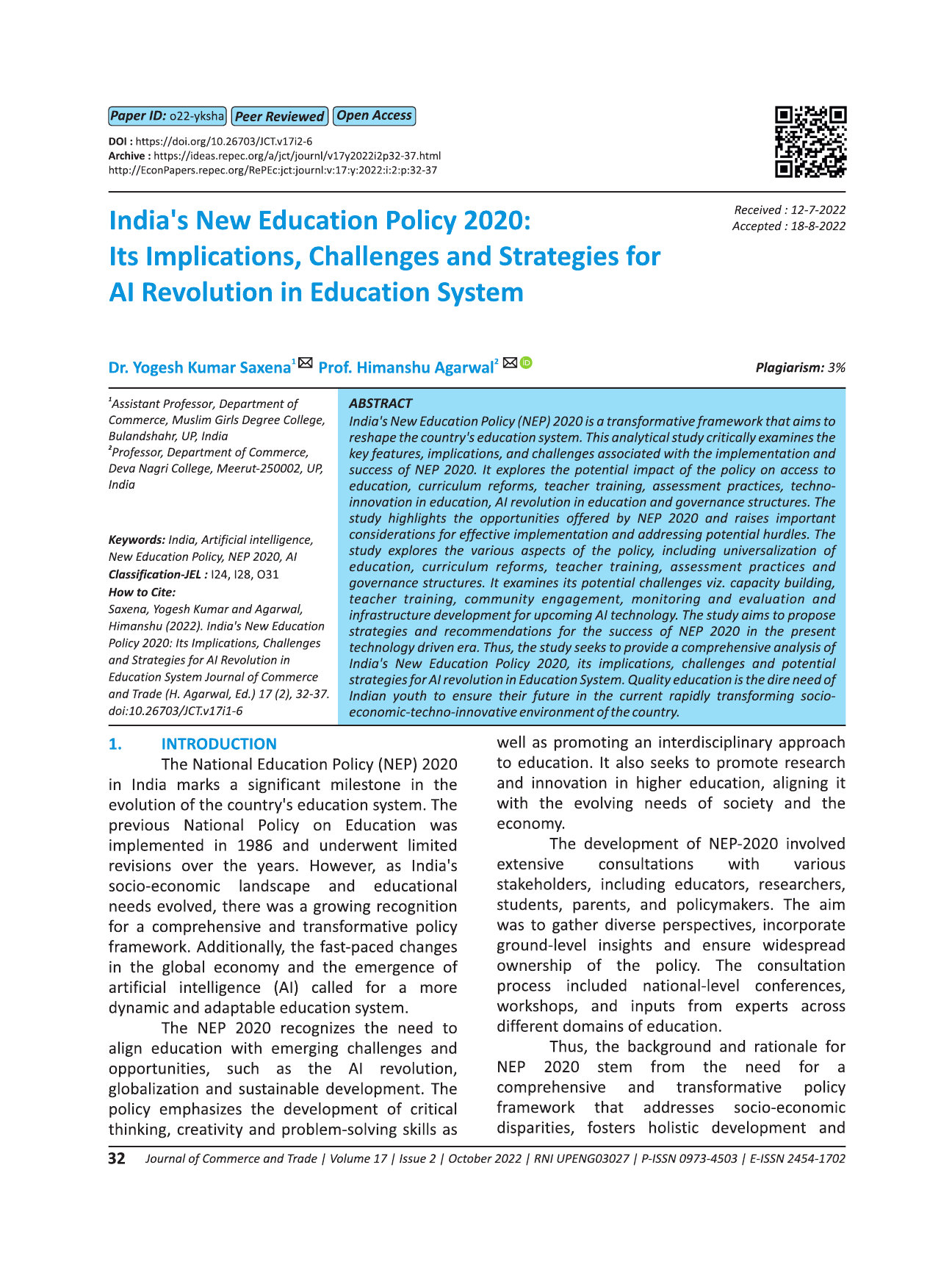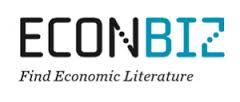India's New Education Policy 2020: Its Implications, Challenges and Strategies for AI Revolution in Education System
DOI:
https://doi.org/10.26703/JCT.v17i2-6Keywords:
AI, India, Artificial Intelligence, New Education Policy, NEP-2020Abstract
India's New Education Policy (NEP) 2020 is a transformative framework that aims to reshape the country's education system. This analytical study critically examines the key features, implications, and challenges associated with the implementation and success of NEP 2020. It explores the potential impact of the policy on access to education, curriculum reforms, teacher training, assessment practices, technoinnovation in education, AI revolution in education and governance structures. The study highlights the opportunities offered by NEP 2020 and raises important considerations for effective implementation and addressing potential hurdles. The study explores the various aspects of the policy, including universalization of education, curriculum reforms, teacher training, assessment practices and governance structures. It examines its potential challenges viz. capacity building, teacher training, community engagement, monitoring and evaluation and infrastructure development for upcoming AI technology. The study aims to propose strategies and recommendations for the success of NEP 2020 in the present technology driven era. Thus, the study seeks to provide a comprehensive analysis of India's New Education Policy 2020, its implications, challenges and potential strategies for AI revolution in Education System. Quality education is the dire need of Indian youth to ensure their future in the current rapidly transforming socioeconomic- techno-innovative environment of the country.
Classification-JEL: I24, I28, O31
Downloads
References
Agarwal, Himanshu & Rashid. (2020). Role of ICT and Education Level in Financial Inclusion of Rural Population.
DOI: 10.1201/9781003130864-24.
Agarwal, Himanshu & Yadav, Mohit (2020). Contribution of Digitalized Education in the Advancements of Knowledge Economy in India. International Conference on Role of ICT in Higher Education: Trends, Problems and Prospects (ICRIHE 2020) organised by Institute of Information Technology & Management (IITM), Janakpuri, Delhi. 14-15 February, 2020. Abstract Published in Souvenir (ISBN-978-93-5396-683-6) p.7.
Aithal, P. S. & Aithal, Shubhrajyotsna (2019). Analysis of Higher Education in Indian National Education Policy Proposal 2019 and its Implementation Challenges. International Journal of Applied Engineering and Management Letters (IJAEML), 3(2), 1-35.
DOI: http://doi.org/10.5281/Zenodo.3271330
Aithal, P. S. & Shubhrajyotsna Aithal (2019). Building World-Class Universities: Some Insights & Predictions. International Journal of Management, Technology, and Social Sciences (IJMTS), 4(2), 13-35. DOI: 10.5281/zenodo.3377097.
Draft National Education Policy 2019, https://innovate.mygov.in/wpcontent/uploads/2019/06/mygov15596510111.pdf
Glewwe, P. and Muralidharan, K. 2016. Improving Education Outcomes in Developing Countries: Evidence, Knowledge Gaps, and Policy Implications. Handbook of the Economics of Education. Elsevier. vol. 5, pp. 653–743. DOI: 10.1016/B978-0-444-63459-7.00010-5
Global Education Evidence Advisory Panel. 2020. Cost Effective Approaches to Improve Global Learning: What Does Recent Evidence Tell Us are “Smart Buys” for Improving Learning in Low- and Middle-Income Countries?” World Bank, Washington, DC. https://www.worldbank.org/en/topic/teachingandlearning/publication/cost-effectiveapproaches-to-improve-global-learning
Kingdon, G.G. 2020. The Private Schooling Phenomenon in India: A Review. The Journal of Development Studies. vol. 56, issue 10, pp. 1795-1817. DOI: 10.1080/00220388.2020.1715943
National Education Policy 2020. https://www.mhrd.gov.in/sites/upload_file s/mhrd/files/nep/NEP_Final_English.pdf referred on 10/08/2020.
Verma, Dr & Kumar, Adarsh. (2021). New Education Policy 2020 of India: A Theoretical Analysis. International Journal of Business and Management Research. 9. 302-306. 10.37391/IJBMR.090308.

Downloads
Published
Issue
Section
License
Copyright (c) 2022 Dr. Yogesh Kumar Saxena, Prof. (Dr.) Himanshu Agarwal

This work is licensed under a Creative Commons Attribution 4.0 International License.










